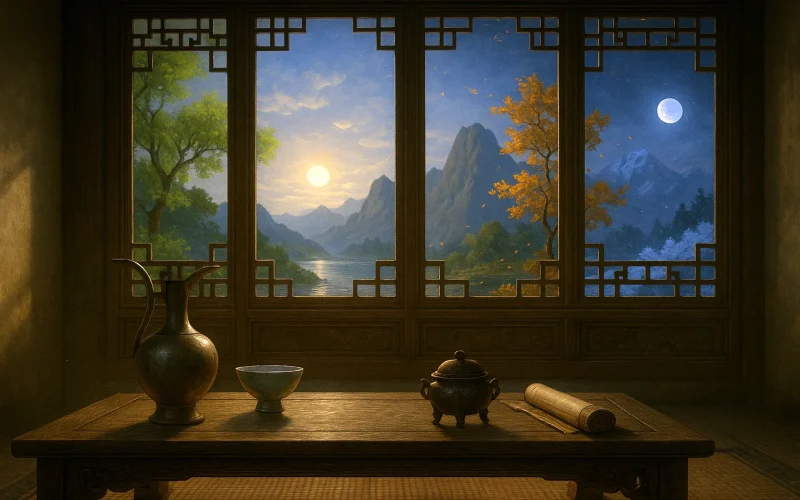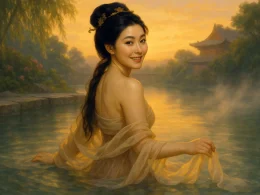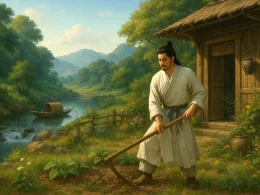All men who rise will then decline,
Such is your fate as well as mine.
The melon-grower in the field
Was noble lord who would not yield.
Winter replaces summer days,
Such is the world and all men's ways.
The wise men who find the truth out,
Will not again put it in doubt.
Fill our cups of wine with delight,
Be intoxicated day and night!
Original Poem
「饮酒 · 其一」
陶渊明
衰荣无定在,彼此更共之。
邵生瓜田中,宁似东陵时。
寒暑有代谢,人道每如兹。
达人解其会,逝将不复疑。
忽与一觞酒,日夕欢相持。
Interpretation
This poem was composed in 416 AD during a pivotal historical moment. Liu Yu had completed multiple military campaigns consolidating his power, and was mobilizing forces for a western expedition against the Later Qin dynasty. His unbroken chain of victories significantly strengthened his political position, granting him unprecedented authority that even the imperial court could not restrain. Though living as a recluse far removed from officialdom, Tao Yuanming remained acutely observant of national affairs. Having foreseen the Eastern Jin dynasty's inevitable collapse and Liu Yu's impending usurpation, the poet composed this series of "Drinking Wine" poems in a state of sober melancholy - recognizing both the futility of resisting natural cycles and the need to transcend worldly sorrows through wine and detachment. This first poem, likely written in autumn/winter, blends social critique with philosophical insight.
First Couplet: "哀荣无定在,彼此更共之。"
Āi róng wú dìng zài, bǐcǐ gèng gòng zhī.
Grief and glory know no abode,/ Forever shifting 'tween you and me.
This establishes the poem's central thesis on impermanence, where political fortunes and personal destinies interchange unpredictably - a veiled commentary on the turbulent regime changes.
Second Couplet: "邵生瓜田中,宁似东陵时?"
Shào shēng guā tián zhōng, níng sì Dōnglíng shí?
Shao Ping toiling in melon fields -/ Does he recall his Marquis days?
The allusion to Shao Ping (邵平), the former Marquis of Dongling reduced to farming after the Qin collapse, subverts conventional success/failure paradigms through agricultural imagery.
Third Couplet: "寒暑有代谢,人道每如兹。"
Hán shǔ yǒu dàixiè, réndào měi rú zī.
Cold and heat alternate their reign,/ So too the human condition.
Tao extends his natural metaphor, equating political cycles with seasonal changes - both governed by cosmic laws beyond mortal control.
Fourth Couplet: "达人解其会,逝将不复疑。"
Dárén jiě qí huì, shì jiāng bù fù yí.
The enlightened grasp this truth,/ And cast their doubts away.
The "enlightened" (达人) represents Tao's ideal: those who comprehend nature's patterns transcend anxiety about temporal vicissitudes.
Fifth Couplet: "忽与一觞酒,日夕欢相持。"
Hū yǔ yì shāng jiǔ, rìxī huān xiāng chí.
Suddenly, a cup of wine -/ Dawn to dusk, joy sustained.
The closing image transforms wine from literal drink to spiritual sustenance, symbolizing how simple pleasures anchor one amidst chaos.
Holistic Appreciation
The poem's architecture moves from political observation (couplet 1) to historical precedent (2), natural analogy (3), philosophical resolution (4), and finally embodied practice (5). This progression mirrors Tao's own journey from social engagement to rural withdrawal. The deceptively simple diction - particularly the final "suddenly" (忽) - masks sophisticated structural intentionality, where each couplet advances the argument like agricultural terraces ascending a mountain.
Artistic Merits
This poem employs symbolism as its foundational technique, using the imagery of a "stray bird" and a "lone pine" to trace the poet's psychological journey of self-identification, introspection, and ultimate spiritual liberation. Characterized by unadorned classical diction and seamless fusion of scene and sentiment, it exemplifies Tao Yuanming's mastery of expressing profound ideals through natural imagery—a paradigmatic work where allegory becomes the vehicle for emotional catharsis and moral resolve.
Insights
Tao's meditation on impermanence speaks powerfully to our age of disruptive technologies and geopolitical realignments. His solution - cultivating inner clarity through engagement with nature's rhythms and mindful practices (symbolized by wine) - anticipates contemporary mindfulness movements. The poem ultimately suggests that true political awareness begins with understanding one's position within nature's grand patterns rather than resisting them.
Poem translator
Xu Yuanchong (许渊冲)
About the poet

Tao Yuanming(陶渊明), 365 – 427 CE, was a poet, literary figure, fu writer, and essayist active during the late Eastern Jin and early Liu Song dynasties. Born in Chaisang (near present-day Jiujiang, Jiangxi Province), he pioneered a new genre of pastoral-themed literature, expressing profound philosophical insights through simple language. His poetic style became an enduring aesthetic standard in classical Chinese poetry.











